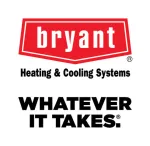Few things are as frustrating as an AC that won't turn on, especially during a hot Georgia summer. Before panicking or calling a technician, you can check several common issues that might be causing your air conditioner to stay off. Some problems are simple DIY fixes, while others require professional help.
Electrical Issues
1. Tripped Circuit Breaker
A power surge or overload can trip your AC's circuit breaker, cutting off power to the unit. To resolve this issue, first locate your electrical panel and check for a tripped breaker. If you find the AC breaker is off, try switching it back on. However, if it trips again immediately, this indicates a more serious electrical problem that requires professional attention. Don't attempt multiple resets as this could indicate a dangerous underlying issue.
2. Blown Fuse
Blown fuses in the disconnect box near your outdoor unit can prevent your AC from running. If you're comfortable using a multimeter, you can check for continuity in the fuses. When blown fuses are discovered, they should be replaced with new ones of the same amperage rating. If you're unsure about handling electrical components or the problem persists, it's best to contact an HVAC technician for proper diagnosis and replacement.
Control and Sensor Problems
3. Thermostat Issues
A faulty or improperly set thermostat can prevent your AC from turning on. First, ensure the thermostat is set to "Cool" mode and the temperature setting is lower than the current room temperature. If your thermostat is battery-powered, try replacing the batteries. When the device remains unresponsive after these basic checks, you may need to consider replacing the thermostat with a newer model.
Airflow and Maintenance Issues
4. Clogged Air Filter
A dirty air filter can restrict airflow, causing your system to overheat and shut down. Check your filter and replace it if it appears dirty or hasn't been changed in the past three months. Make it a habit to inspect your filter monthly during peak cooling season and replace it every 1-3 months, depending on usage and environmental conditions. This simple maintenance task can prevent numerous AC problems.
5. Dirty Condenser Coils
When dirt and debris accumulate on your outdoor unit's coils, it can cause overheating and system failure. The solution is to turn off the AC and carefully clean the coils using a soft brush or specialized coil cleaner. Remember to clear away any vegetation, leaves, or debris around the unit to ensure proper airflow. Regular cleaning and maintenance of condenser coils can significantly extend your system's lifespan.
Technical Problems
6. Refrigerant Leak
Low refrigerant levels can prevent your AC from cooling properly and may cause system shutdown. Look for signs like ice buildup on the refrigerant lines or weak cooling performance. If you suspect a leak, contacting a professional is crucial. Only licensed HVAC technicians can properly diagnose, repair, and recharge your system's refrigerant.
7. Faulty Capacitor
The capacitor plays a crucial role in starting your AC's motor. When it fails, your unit won't turn on properly. Listen for clicking sounds when attempting to start the system - this is often a telltale sign of capacitor problems. Due to the electrical nature of this component, replacement should only be performed by a qualified HVAC technician.
8. Clogged Drain Line
A clogged condensate drain line can trigger your system's safety switch, preventing operation. You can attempt to clear the line using a wet/dry vacuum, but prevention through regular maintenance is the best approach. Consider having a professional clean your drain line annually and install algae tablets in the drain pan to prevent future clogs.
9. Compressor Failure
Compressor problems represent one of the most serious AC issues. If your outdoor unit produces strange noises or your system isn't cooling properly, the compressor might be failing. This critical component usually requires professional replacement, and in older systems, it might be more cost-effective to replace the entire unit.
10. Faulty Contactor
The contactor controls electrical flow to your AC system, and its failure will prevent startup. When turning on your unit, listen for a clicking sound - if you hear clicking but the unit doesn't start, the contactor might be the culprit. Only a qualified technician should diagnose and replace a failing contactor due to the electrical hazards involved.
If you're in Roswell, Sandy Springs, or Dunwoody, GA, and need expert AC repair, call The Air Company of GA at 470-291-5423 today!



